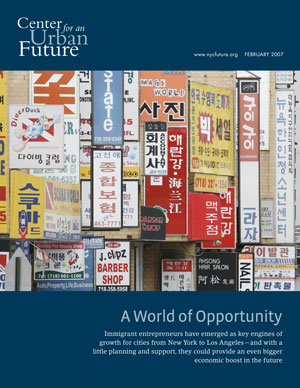With New York City's foreign-born population at an all-time high—2.87 million of these new arrivals called the Big Apple home in 2000—immigrant entrepreneurs are having a significant impact on New York's economy and on the growth of neighborhoods around the five boroughs. But some experts say this could be just the beginning. To get the low-down, the Center for an Urban Future went to speak with Arturo Ignacio Sánchez, an urban planner based at LaGuardia Community College and a longtime member of Queens Community Board 3, representing much of Jackson Heights, East Elmhurst and Corona.
CUF: New York City has seen a huge influx in immigrants over the past two decades, many of who have been starting and growing businesses. How important are these immigrant-owned businesses to the city's economy?
AS: Immigrants are very important for the city, and not just from an economic point of view. Obviously, immigrant entrepreneurs provide a robust multiplier effect to the local and citywide economy. They are participating in the social and economic revitalization of neighborhoods. Historically, entrepreneurship and immigration have been roads to the middle class, and I think it continues to be the case today. But immigrant entrepreneurship also allows entrée into the social and political process. And it becomes a trampoline for placing the second generation on a different trajectory.
CUF: What happens with the second generation?
AS: The entrepreneurs’ kids are going to college. Small businesses, in this sense, are very good. They serve as a conduit for the development of a professional and technical sub-set of dynamic individuals who possess the language and cultural skills that reposition them to expand local labor markets and diversify the city's tax base. This virtuous circle is good for the city. I think it serves this city—a global city—very well that this entrepreneurial class is sending their kids on to college. These kids are entering the professions with the kinds of language and cultural skills that can make New York much more competitive.
CUF: Many of these immigrant-owned businesses are small, but could this be an area ripe for growth in the future?
AS: Yes. If we look at employment patterns in New York City, it's small firms that are providing the employment.
CUF: Is this already a part of the city's economic development strategy?
AS: One of the things that we've seen in terms of the general economy of New York is that most of what public policy is all about is generating employment and growth in particular sectors of the economy, usually at the high end. But we've had this massive demographic shift. The kinds of skills immigrants bring along, and the cultural capital, is pretty heterogenous. But the entry point for many immigrants is not high-level jobs. It's in most cases low-end jobs.
CUF: I hear that many immigrant entrepreneurs don't understand basic rules and regulations connected with running a business in New York, and this often results in fines or penalties for these businesses.
AS: Many don't understand that by reporting gains in income over a period of time impacts your credit rating, which allows you to have access to financing. They don't know about this because, for many of these immigrant entrepreneurs, they started their businesses without having access to formal capital markets. In many cases, they've cobbled something together with credit cards and with family support.
CUF: Is this something local government and non-profit organizations should be dealing with?
AS: What I've seen is that there is very little outreach by community boards and local government to systematically and consistently reach out to these populations. That requires language abilities, it requires cultural sensitivity, and that just hasn't happened at the rate that it should have happened by now. We're beginning to see changes. For example, in Community Board 3, much of what [current board chairman] Richard Cecere and the Executive Board does is based on a working assumption that northwestern Queens is experiencing massive demographic changes. They see that local government must aggressively reach out and incorporate our newest New Yorkers in ways that empower them as full participants in the city's short- and long-term future. That's the first thing that needs to be recognized.



